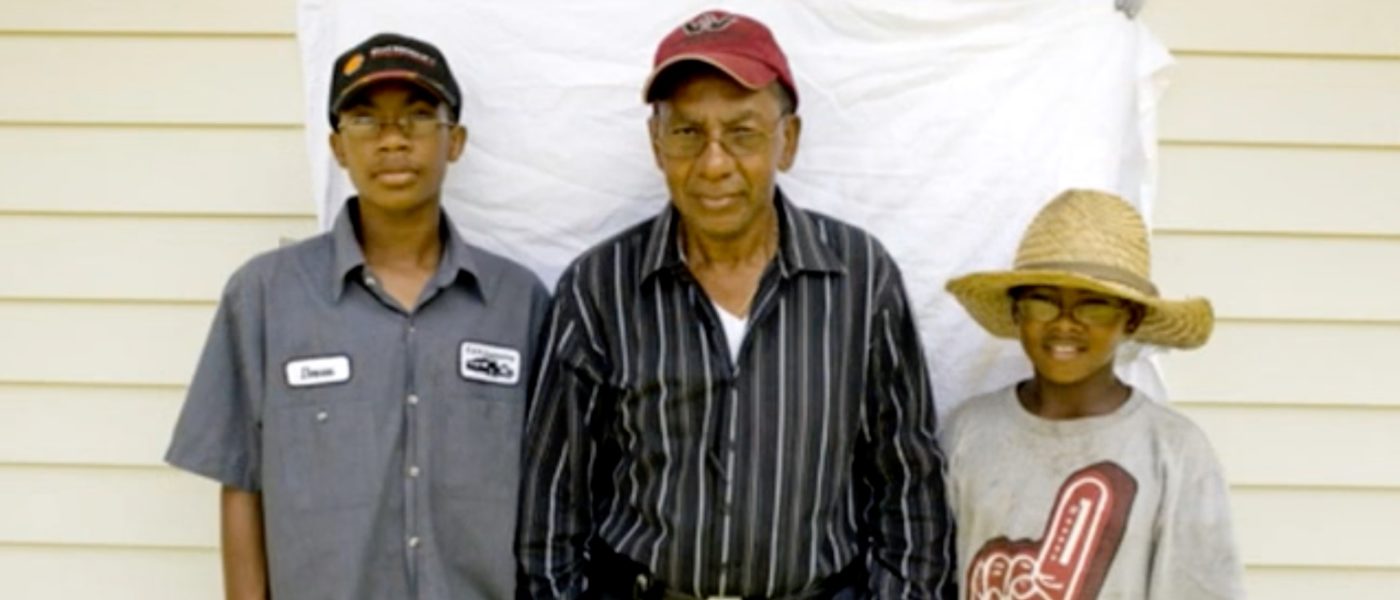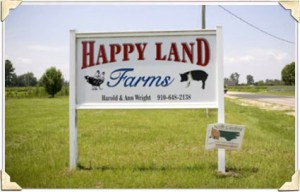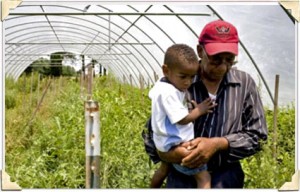Harold and Ann Wright, owners of Happy Land Farms, couldn’t even comprehend the idea of putting their five-generation farm to rest when the demand for tobacco died and many North Carolina farmers left their land. Instead, they made the transition from growing tobacco to providing good food for both their kitchen table and community.
“We were concerned about our own health and we thought if we were concerned about our own, other people would be concerned about theirs,” said Harold Wright. “People are concerned about what they eat and where the food comes from.”
Harold is a third-generation farmer at Happy Land Farms, and his children and grandchildren join him in working the land, bringing the total generations involved in Happy Land Farms to five. His grandfather, William Wright, started the farm in Bladen County during the early 1900s, growing tobacco and corn when profits ran high. The tobacco provided a steady income for William and thousands of North Carolina farmers. Harold started farming in 1957, and he continued to grow tobacco until the profit margin declined and it became obvious that tobacco would not sustain North Carolina indefinitely.
When many lifelong and multi-generational tobacco farmers left their land and sought other sources of income, the Wrights knew they wouldn’t give up so easily. With an optimistic outlook, they slowly began to prepare for a transition to growing fresh produce, and eventually adding free-range antibiotic-free chickens, hogs and cows.
The Wrights had big plans for their land, but knew the transition wouldn’t come easily. They started looking into grants and eventually found the Tobacco Communities Reinvestment Fund (TCRF) through RAFI, a program that used money from the Tobacco Master Settlement Agreement to help former tobacco farmers implement their own creative strategies to reinvent their farm.
Once they proposed their new plans, the Wrights received a TCRF grant and started to renovate the farm to support their new products. They turned old tobacco sheds into chicken houses and found ways to use tobacco equipment for produce by turning tobacco greenhouses into tunnels, or hoophouses, for vegetable production. When adding chickens, ducks, hogs and cows, they committed to keeping them free-range and antibiotic-free, and even started growing their own corn to feed the animals.
Transitioning from tobacco meant losing some acres and facing new challenges, but the Wrights don’t see this as a negative.
“It brought us closer together,” said Harold. With less land to work, “we could spend more time with one another.”
Now, Harold, his wife Ann, three of their children and all of their grandchildren work the farm. Harold and Ann’s daughter, Candice, has played an important role in helping the family market their products and gain a local customer base and online presence.
Farmers who grow tobacco don’t interact with their customers – they grow their crops under contract and don’t play a role in the rest of the process. Making the transition to produce and livestock meant the Wrights had to learn how to get their products in stores and onto the plates of families in the community.
“It’s kind of hard getting into the market. Most of our business comes from a 45-mile radius, but then we have people that find us on the Internet,” said Candice. She’s learned everything she knows about marketing by doing her own research, and has recently started work to get Happy Lands Farm products into Whole Foods Market and other local markets. “That has been my challenge,” she said.
Now, the Wrights work the land together and serve as an inspiring example for their community. Each year, they give farm tours to those in neighboring counties to pass along some of the techniques and lessons they have learned through experience.
“People are very interested in what we’re doing and how we do things. It makes me feel good,” Harold said.
The Wrights hope that Happy Land Farms will remain a valuable asset for their children and grandchildren. They’ve loved watching them grow up on the farm, learning, working and eating good food.
“I think it’s very important to your health. You are what you eat,” said Harold. “It makes us feel good to sit around the table on Sunday and everything we eat comes from our farm.”
Watch this video created by Alix Blair for RAFI to hear Harold Wright talk about his family farm. The photos above came from this video, under the Creative Commons license.
Further Reading
- Read “A New Farm Economy Rises from Tobacco’s Ashes” to learn more about North Carolina’s long history of tobacco growing, how that market crashed, and how resourceful farmers have made the transition to growing healthy food.
- To find food from family farmers like Harold and Ann Wright in your area, check out our Find Good Food page.





